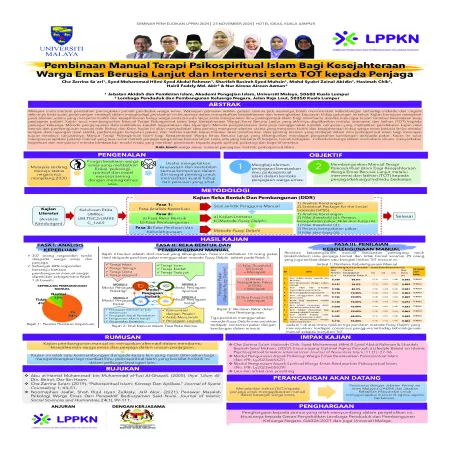|
Pembinaan manual terapi psikospiritual Islam bagi kesejahteraan warga emas berusia lanjut dan intervensi serta TOT kepada penjaga
|
|
: 51056 Views : |
| Item type | Scientific Poster |
| Subjects | 600 Technology > 607 Education, research & related topics |
| Division/Agency | LPPKN - National Population and Family Development Board, Malaysia: Population and Family Research Division |
| Keywords | Elderly, Islamic Psychospiritual Therapy |
| Additional Information | This poster have been presented at Seminar Penyelidikan LPPKN 2024, November 25, 2024 in IDEAS Hotel Kuala Lumpur. |
| Abstract | The aging population in Malaysia is increasingly becoming a concern. Although aging is a natural process, its effects can cause anxiety among individuals and the country if there is no strategic planning to address it, particularly in maintaining the well-being and improving the quality of life for the elderly. This study aims to identify key elements that ensure the quality of life and well-being of the elderly and analyze Islamic psychospiritual knowledge to help achieve these goals based on palliative care. The study also develops an Islamic Psychospiritual Therapy Manual for Elderly Well-being, which is applied through intervention and training (TOT) for caregivers/families. Data collection methods include literature review and fieldwork, while data analysis uses a mixed-method approach involving Richey and Klein's design and development study. This research will provide important data on the key elements that guarantee the quality of life for the elderly through field data collection (surveys, expert group discussions), and literature research will give valuable insights into psychospiritual elements in Islam that can help achieve this. Additionally, the developed manual for elderly well-being was content-validated by experts. This study also has the potential for widespread application, such as training elderly caregivers, whether working in hospitals, welfare homes, or within families, to better understand, meet the needs, and care for elderly individuals based on the therapeutic module focusing on spiritual, psychological, and cognitive aspects. |











